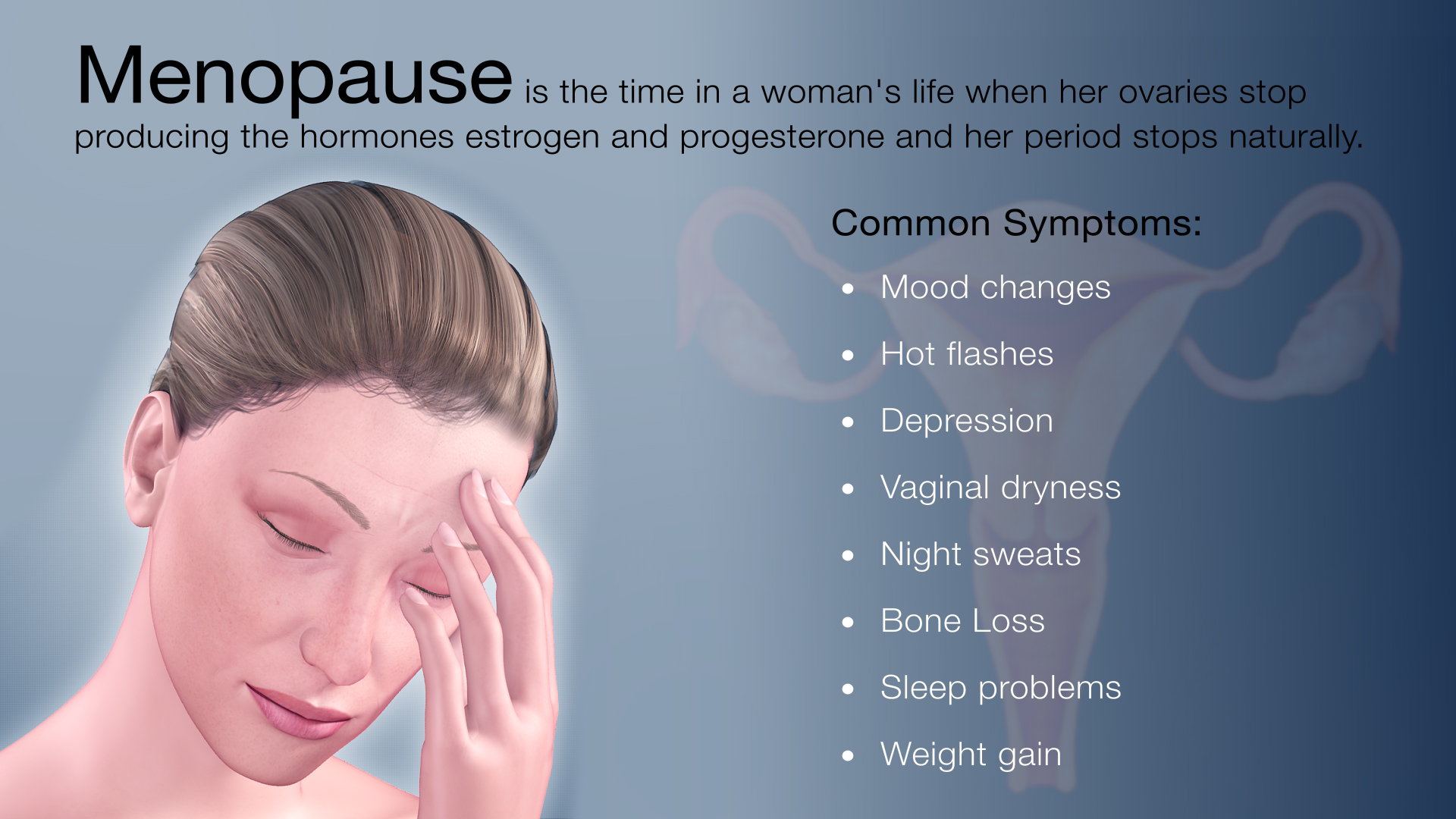Menopause is the time when a woman stops menstruating. It usually begins between the age of 45 and 55 years but can also happen before or after it. Menopause happens when a woman hasn’t menstruated for 12 or more than 12 months and she can no longer become pregnant naturally. It is a natural and biological process and every woman goes through this phase. Menopause affects the health of women in many ways such as disruption in the sleep and changes in emotional health.

Symptoms
The symptoms for menopause vary from woman to woman. But in the months leading to menopause, a woman can experience several symptoms such as:
- Irregular periods
- Weight gain
- Anxiety
- Insomnia
- Dryness in the vagina
- Dryness on the skin, mouth, and eyes
- Infection in the urinary tract
- Headache
- Tender or sore breasts
- Memory problems
- Reduced sex drive
- Increased urge to urinate
- Night sweats
- Lighter or heavier periods for longer or shorter days than they use to experience earlier
- Problems in sleeping
- Hair thinning
- Insomnia
- Difficulty in concentration
- Increased hair growth on back, face, chest, and neck
- Pain in the joints
Irregularity in the periods before it ends is very common in women.
Causes
Menopause is a natural and biological process that happens when the ovaries of a woman ages and stops producing reproductive hormones. The body lowers the level of estrogen, follicle-stimulating hormone, testosterone, progesterone, and luteinizing hormone. Apart from the natural process menopause can also be caused due to:
Primary ovarian insufficiency- This is a very rare case for menopause as only one percent of women face this. In this case, the menopause happens before the age of 40 when the ovaries of a woman fail to produce reproductive hormones to a normal level owing to genetic causes or autoimmune diseases.
Radiation therapy or chemotherapy- Cancer therapies such as chemotherapy or radiation therapy also induces menopause leading to symptoms such as hot flashes during the treatment or shortly after the treatment. But in this case, many women do not face the problem of menopause as the periods might start after pausing for some days.
Hysterectomy- Hysterectomy is a surgical method to remove the uterus but not the ovaries. In this case, menopause doesn’t start immediately after the surgery but can cause menopause in the long run. Although women do not experience periods, the ovaries still produce eggs, estrogen, and progesterone.
Bilateral oophorectomy and total hysterectomy- This is a surgical method to remove both the uterus and ovaries. In this case, the period stops instantly and women are likely to have hot flashes and other symptoms which can be severe as the hormonal changes have occurred abruptly.
Treatment
As menopause is a natural process, it does not require any treatment. But treatments are required to reduce the signs and symptoms of this. Treatments recommended by physicians include:
- Hormonal therapy- It is done to relieve the menopausal hot flashes but inducing certain hormones in the body as per the requirement.
- Vaginal estrogen- It is done to relieve the dryness of the vagina which can be given in the form of a vaginal cream, tablet, or ring. The cream or tablet releases a little amount of estrogen in the vagina which is absorbed by the vaginal tissues to relieve vaginal discomfort and dryness during intercourse and urination.
Other treatments include medications to control symptoms such as insomnia, headache, and several other symptoms. An experienced physician must be consulted for better diagnosis and treatment of the symptoms.
Disclaimer: The information in no way constitutes, or should be construed as medical advice. Nor is the above article an endorsement of any research findings discussed in the article an endorsement for any of the source publications.








